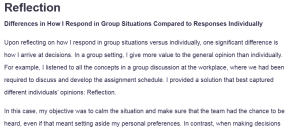Reflection
Differences in How I Respond in Group Situations Compared to Responses Individually
Upon reflecting on how I respond in group situations versus individually, one significant difference is how I arrive at decisions. In a group setting, I give more value to the general opinion than individually. For example, I listened to all the concepts in a group discussion at the workplace, where we had been required to discuss and develop the assignment schedule. I provided a solution that best captured different individuals’ opinions: Reflection.
In this case, my objective was to calm the situation and make sure that the team had the chance to be heard, even if that meant setting aside my personal preferences. In contrast, when making decisions individually, my process tends to be more direct and aligned with my priorities. For instance, while deciding the shifts I need to do, I think about what I want and what fits me best, swiftly deciding without external input or deliberation.
Another key difference is how I handle conflicts or disagreements. In a group, I am more formal and not very vocal as I distinguish between my professionalism and respect. A particular case is that once, during a departmental meeting, a disagreement about a new protocol was observed. In expressing my dissent to the changes, I countered my concerns in a non-argumentative manner that sought a common purpose.
Individually, however, I am more straightforward and candid. For instance, when providing feedback to a colleague face to face, I speak my mind without holding back as I would when in a group. This shows how my approach differs depending on the environment and the corresponding interactions present.
Empowerment in Group Work
Empowerment in group work is the process of making sure all the group members are capable of contributing toward the achievement of the laid down objectives toward a shared goal. When individuals feel empowered, they can engage more, be more proactive, and work in a team (Coun et al., 2021). For instance, assigning roles based on strengths and encouraging open dialogue can help everyone feel valued and motivated when organizing a work assignment in a project team. In addition, effective empowerment also engenders trust and positive regard from the members of a group and organization, hence optimizing collective achievement over individual gain.
The Importance of Finding “Common Ground” in Mediating Conflicts
Finding “common ground” helps group leaders work while resolving conflict by focusing on goals and common interests that bring together opposite poles. When leaders emphasize the commonalities among group members, it reduces the sense of division and fosters cooperation. For instance, during a group discussion or a conflict over the strategies for handling a project, a leader can explain to the group that they all have to see that the project is successful.
This approach enables all members to stop paying attention to the quirkiness of behaviors and start to address problems together. Such a feeling of togetherness also ensures that the members understand each other, enabling working teams to agree on the most convenient solutions to present problems. Lastly, finding common ground empowers the leaders to guide the group in making decisions and resolving issues while maintaining relationships and employee morale.
The Impact of Group Setting on the Ability to Be More Confrontational
In a group setting, my ability to be more confrontational about complex material is often tempered by the need to maintain harmony and avoid disrupting group dynamics. I am more conservative and obliging, as I always try to avoid offending others or creating conflicts. Having people with different perceptions of the group makes me reflect on how well the subjects that may provoke conflict are dealt with discretely.
I fully know how my confrontational approach could affect the group’s cohesion. More focus on recognizing various group characteristics prevents me from expressing my confrontations, and instead, I use intermediate, less assertive strategies to address the problem.
However, in a group setting, there is also a potential for shared support, making it easier to confront complex material collectively. When everyone in the group has similar apprehensions or similar issues, I find myself in a better position to speak for myself, knowing that there is a collective understanding or backing. This can lead to the belief that one has to challenge the material to engage in a healthy confrontation; therefore, accepting complex material is encouraged. The presence of others willing to address uncomfortable topics makes me more comfortable taking an adversarial view because it almost always results in discussion and a possible solution.
References
Coun, M. J. H., Peters, P., Blomme, R. J., & Schaveling, J. (2021). “To empower or not to empower, that’s the question”. Using an empowerment process approach to explain employees’ workplace proactivity. The International Journal of Human Resource Management, 33(14), 1–27. https://doi.org/10.1080/09585192.2021.1879204
ORDER A PLAGIARISM-FREE PAPER HERE
We’ll write everything from scratch
Question
Write a reflective discussion post in a narrative style with a minimum of 750 words, using the questions below to guide your reflections.
- Discuss two differences in how you respond in a group situation as opposed to your responses individually. Give specific examples.
- Discuss empowerment in group work.
- How does finding “common ground” help group leaders mediate conflicts?
- How does a group setting impact your ability to be more confrontational around discussions of difficult material?
Reflection


